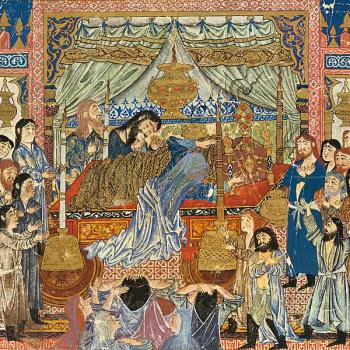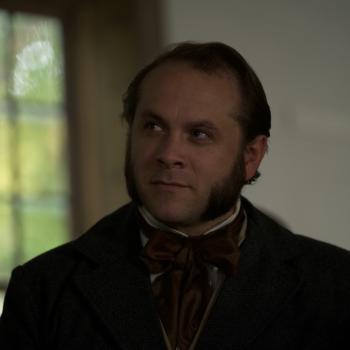
Wikimedia Commons public domain image
***
Under the Banner of Heaven continues to enjoy its fifteen minutes of fame, so here are another couple of interesting reads on the subject:
“What ‘Under the Banner of Heaven’ gets right — and wrong — about Mormons”
I don’t agree with everything in the interview. I do, however, like this article in the Wall Street Journal:
***
A couple of passages from Friedrich Nietzsche, The Antichrist: A Criticism of Christianity [1888], translated by Anthony M. Ludovici (New York: Barnes and Noble, 2006). But, first, a few lines from Dennis Sweet’s introduction to this edition:
In earlier books Nietzsche had made that most profound announcement: “God is dead.” In other words, there are no absolute, unconditional, or objective values in the world. Whatever meanings that exist in life are put there by us, by human beings, by “value-creators.” (vii)
Now to Nietzsche himself:
What is good? All that enhances the feeling of power, the Will to Power, and power itself in man. What is bad? — All that proceeds from weakness. What is happiness? — The feeling that power is increasing — that resistance has been overcome.
Not contentment, but more power; not peace at any price, but war; not virtue, but efficiency [not quite the right translation, in my view, of Tüchtigkeit, but it will serve] (virtue in the Renaissance sense, virtù, free from all moralic acid). The weak and the botched shall perish: first principle of our humanity. And they ought even to be helped to perish.
What is more harmful than any vice? — Practical sympathy with all the botched and the weak — Christianity. (Section 2, page 4)
Although I think that Nietzsche would have found Nazism and the Nazis repulsive and contemptible, it’s not difficult to see why they were attracted to at least some of what he said.
Plainly, too, he had come heavily under the influence of Darwinism:
Christianity is called the religion of pity. — Pity is opposed to the tonic passions which enhance the energy of the feeling of life: its action is depressing. A man loses power when he pities. By means of pity the drain on strength which suffering itself already introduces into the world is multiplied a thousandfold. Through pity, suffering itself becomes infectious; in certain circumstances it may lead to a total loss of life and vital energy. . . . On the whole, pity thwarts the law of development which is the law of selection. It preserves that which is ripe for death, it fights in favor of the disinherited and the condemned of life; thanks to the multitude of abortions [perhaps better, “misfits”?] of all kinds which it maintains in life, it lends life itself a sombre and questionable aspect. People have dared to call pity a virtue (– in every noble culture it is considered as a weakness –); people went still further, they exalted it to the virtue, the root and origin of all virtues. (Section 7, page 6)
My question, to those who believe that “God is dead” (or, less literarily, that God never existed) and that, accordingly, there are no absolute, unconditional, or objective values in the world and that whatever meanings that exist in life are put there by us, by human beings, by “value-creators,” is this:
You may well find Nietzsche’s moral stance above distasteful. I certainly do. But is it “wrong”? Can anything, in a world where there are no objective or absolute values, actually be said to be “wrong”? And, if you believe that it can be, how would you demonstrate to someone agreeing with Nietzsche that he or she is “wrong”?
To take it back to Under the Banner of Heaven and the Lafferty murders, on what Nietzschean basis can you condemn the Laffertys? On what basis, even, can you, if you’re a follower of Nietzsche, condemn alleged Latter-day Saint misogyny, patriarchy, obscurantism, and fanaticism?
***
Friedrich Nietzsche grew up the son of a Protestant pastor in Switzerland, but soon not only jettisoned both Christianity and theism but became their very famous and influential avowed enemy. By contrast, my father grew up on an isolated farm outside the tiny, unincorporated town of Garske, Ramsey County, North Dakota, in the upper right hand corner of the state. His Norwegian-born mother, my grandmother, wanted him to become a Lutheran pastor. But never felt “the call.” Not even close.
When the time came for him to attend high school, he was obliged to board with relatives in the comparatively large town of Devils Lake, the county seat, which was located roughly fifteen or twenty miles away. (In the late 1920s, in a remote and rural area very few cars and lacking good roads, a distance of fifteen to twenty miles was considerably further away, practically speaking, than it is today.)
My grandfather — my father’s father — was Danish, though he grew up in America. My grandmother had arrived in the United States from Norway at the age of eighteen.
She was a fairly strict Lutheran, in her way, and she taught her children, including my father, that swearing would send them to Hell.
This posed a problem for my Dad. One of his duties on the family farm was to milk the cows. (His father’s rule was that the boys could stay up as late as they wanted — so long as they were up before dawn to attend to their milking duties. That put a natural brake on their propensity to be adolescent night owls.)
Anyway, as a boy, my father was convinced that it was impossible — simply and literally impossible — to milk cows without swearing. They would invariably hit you in the face with their indescribably filthy tails. Or, alternatively, just when you had filled the milk bucket, they would kick it over, or plant an incredibly filthy foot in it. So you simply had to swear. And they were so stupid, he said, that swearing was the only language that they could understand.
This worried him. Was he bound for Hell?
But then, when he went off to Devils Lake to stay with his “city cousins,” the theological problem of evil became even more acute for him:
Because they lived in the city rather than on a farm, of course, his cousins never had to milk cows. Which meant that they didn’t need to swear. Therefore, it seemed to him, salvation depended upon geography. Because they had grown up in a town, his cousins had a very good chance of going to Heaven. By contrast, though, and solely because he had had the misfortune of being raised on a farm, my father was fated to be damned.
Thus did the theological problem of evil begin to weigh upon the mind of a young North Dakota boy in the late 1920s.
Posted from Jerusalem, Israel












